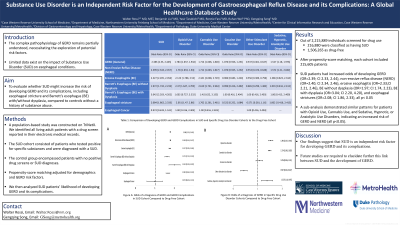Tuesday Poster Session
Category: Esophagus
P3245 - Substance Use Disorder Is an Independent Risk Factor for the Development of Gastroesophageal Reflux Disease and Its Complications: A Global Healthcare Database Study
Tuesday, October 24, 2023
10:30 AM - 4:00 PM PT
Location: Exhibit Hall

Has Audio

Walter Rossi, BA, MST
Case Western Reserve University School of Medicine
Chicagoo, IL
Presenting Author(s)
Walter Rossi, BA, MST1, Benjamin Liu, MD2, Yasir Tarabichi, MD3, Ronnie Fass, MD2, Ruhan Wei, PhD4, Gengqing Song, MD2
1Case Western Reserve University School of Medicine, Cleveland, OH; 2MetroHealth Medical Center, Case Western Reserve University, Cleveland, OH; 3Center for Clinical Informatics Research and Education, Metrohealth Medical Center, Case Western Reserve University, Cleveland, OH; 4Duke University Medical Center, Durham, NC
Introduction: The complex pathophysiology of GERD remains partially understood, necessitating the exploration of potential risk factors. However, limited data exist on the impact of Substance Use Disorder (SUD) on esophageal conditions. Our study aimed to evaluate whether SUD might increase the risk of developing GERD and its complications, including esophageal stricture and Barrett's esophagus (BE) with/without dysplasia, compared to controls without a history of substance abuse.
Methods: A population-based study was constructed on TriNetX. We identified all living adult patients with a drug screen reported in their electronic medical records. The SUD cohort consisted of patients who tested positive for specific substances (phencyclidine, opioids, cocaine/benzoylecgonine, cannabinoids/tetrahydrocannabinol, benzodiazepines, amphetamine, methamphetamine, methylenedioxymethamphetamine, or methylenedioxyamphetamine) and were diagnosed with a SUD. The control group encompassed patients with no positive drug screens or SUD diagnoses. Propensity-score matching adjusted for demographics and GERD risk factors. We then analyzed SUD patients' likelihood of developing GERD and its complications.
Results: Out of 2,215,889 individuals screened for drug use, 216,880 were classified as having SUD, and 1,506,265 as drug-free. After propensity-score matching, each cohort included 215,605 patients. SUD patients had increased odds of developing GERD (OR=2.39; CI 2.33, 2.44), non-erosive reflux disease (NERD) (OR=2.40; CI 2.34, 2.46), erosive esophagitis (OR=2.33; CI 2.21, 2.46), BE without dysplasia (OR=1.97; CI 1.74, 2.23), BE with dysplasia (OR=3.04; CI 2.20, 4.20), and esophageal strictures (OR=2.08; CI 1.86, 2.33), all p< 0.05. A sub-analysis demonstrated similar patterns for patients with Opioid Use, Cannabis Use, and Sedative, Hypnotic, or Anxiolytic Use Disorders, indicating an increased risk of GERD and NERD (all p< 0.05).
Discussion: Our findings suggest that SUD is an independent risk factor for developing GERD and its complications. Future studies are required to elucidate further this link between SUD and the development of GERD.

Disclosures:
Walter Rossi, BA, MST1, Benjamin Liu, MD2, Yasir Tarabichi, MD3, Ronnie Fass, MD2, Ruhan Wei, PhD4, Gengqing Song, MD2. P3245 - Substance Use Disorder Is an Independent Risk Factor for the Development of Gastroesophageal Reflux Disease and Its Complications: A Global Healthcare Database Study, ACG 2023 Annual Scientific Meeting Abstracts. Vancouver, BC, Canada: American College of Gastroenterology.
1Case Western Reserve University School of Medicine, Cleveland, OH; 2MetroHealth Medical Center, Case Western Reserve University, Cleveland, OH; 3Center for Clinical Informatics Research and Education, Metrohealth Medical Center, Case Western Reserve University, Cleveland, OH; 4Duke University Medical Center, Durham, NC
Introduction: The complex pathophysiology of GERD remains partially understood, necessitating the exploration of potential risk factors. However, limited data exist on the impact of Substance Use Disorder (SUD) on esophageal conditions. Our study aimed to evaluate whether SUD might increase the risk of developing GERD and its complications, including esophageal stricture and Barrett's esophagus (BE) with/without dysplasia, compared to controls without a history of substance abuse.
Methods: A population-based study was constructed on TriNetX. We identified all living adult patients with a drug screen reported in their electronic medical records. The SUD cohort consisted of patients who tested positive for specific substances (phencyclidine, opioids, cocaine/benzoylecgonine, cannabinoids/tetrahydrocannabinol, benzodiazepines, amphetamine, methamphetamine, methylenedioxymethamphetamine, or methylenedioxyamphetamine) and were diagnosed with a SUD. The control group encompassed patients with no positive drug screens or SUD diagnoses. Propensity-score matching adjusted for demographics and GERD risk factors. We then analyzed SUD patients' likelihood of developing GERD and its complications.
Results: Out of 2,215,889 individuals screened for drug use, 216,880 were classified as having SUD, and 1,506,265 as drug-free. After propensity-score matching, each cohort included 215,605 patients. SUD patients had increased odds of developing GERD (OR=2.39; CI 2.33, 2.44), non-erosive reflux disease (NERD) (OR=2.40; CI 2.34, 2.46), erosive esophagitis (OR=2.33; CI 2.21, 2.46), BE without dysplasia (OR=1.97; CI 1.74, 2.23), BE with dysplasia (OR=3.04; CI 2.20, 4.20), and esophageal strictures (OR=2.08; CI 1.86, 2.33), all p< 0.05. A sub-analysis demonstrated similar patterns for patients with Opioid Use, Cannabis Use, and Sedative, Hypnotic, or Anxiolytic Use Disorders, indicating an increased risk of GERD and NERD (all p< 0.05).
Discussion: Our findings suggest that SUD is an independent risk factor for developing GERD and its complications. Future studies are required to elucidate further this link between SUD and the development of GERD.

Figure: A: Comparison of Odds of a New Diagnosis of GERD and GERD Complications in SUD Cohort and Drug-Free Cohort
B: Comparison of Odds of a New Diagnosis of GERD in Specific Drug Use Disorder Cohorts and Drug-Free Cohort
B: Comparison of Odds of a New Diagnosis of GERD in Specific Drug Use Disorder Cohorts and Drug-Free Cohort
Disclosures:
Walter Rossi indicated no relevant financial relationships.
Benjamin Liu indicated no relevant financial relationships.
Yasir Tarabichi indicated no relevant financial relationships.
Ronnie Fass indicated no relevant financial relationships.
Ruhan Wei indicated no relevant financial relationships.
Gengqing Song indicated no relevant financial relationships.
Walter Rossi, BA, MST1, Benjamin Liu, MD2, Yasir Tarabichi, MD3, Ronnie Fass, MD2, Ruhan Wei, PhD4, Gengqing Song, MD2. P3245 - Substance Use Disorder Is an Independent Risk Factor for the Development of Gastroesophageal Reflux Disease and Its Complications: A Global Healthcare Database Study, ACG 2023 Annual Scientific Meeting Abstracts. Vancouver, BC, Canada: American College of Gastroenterology.
